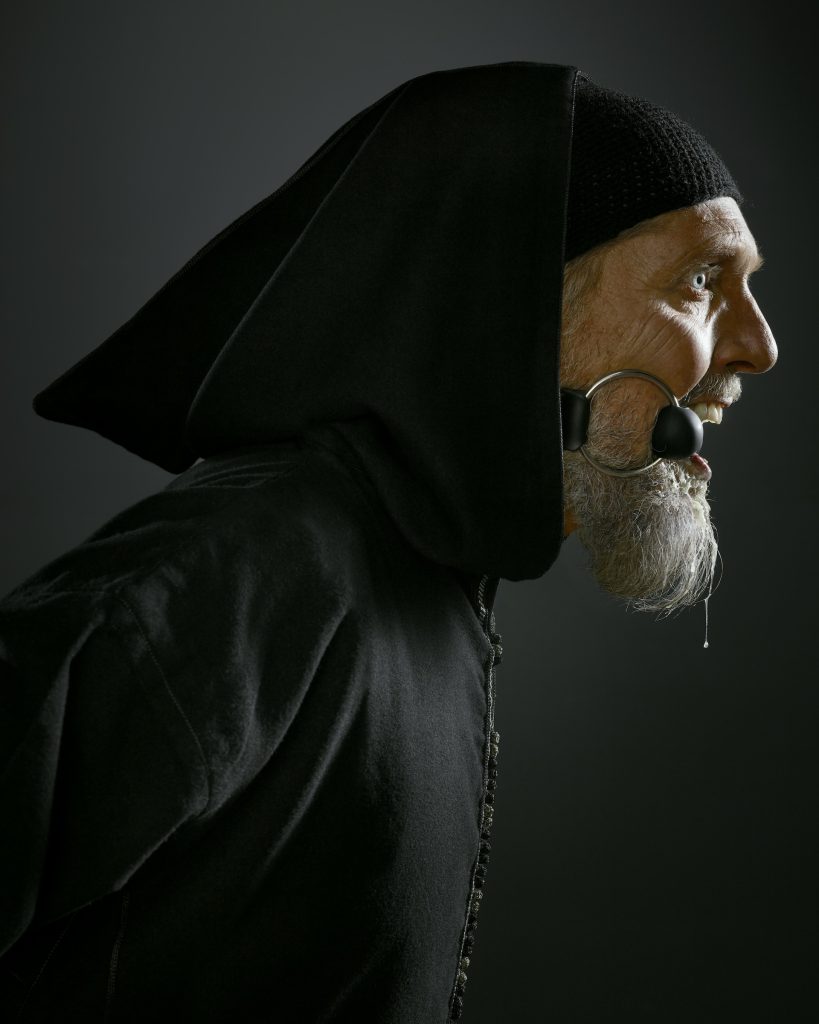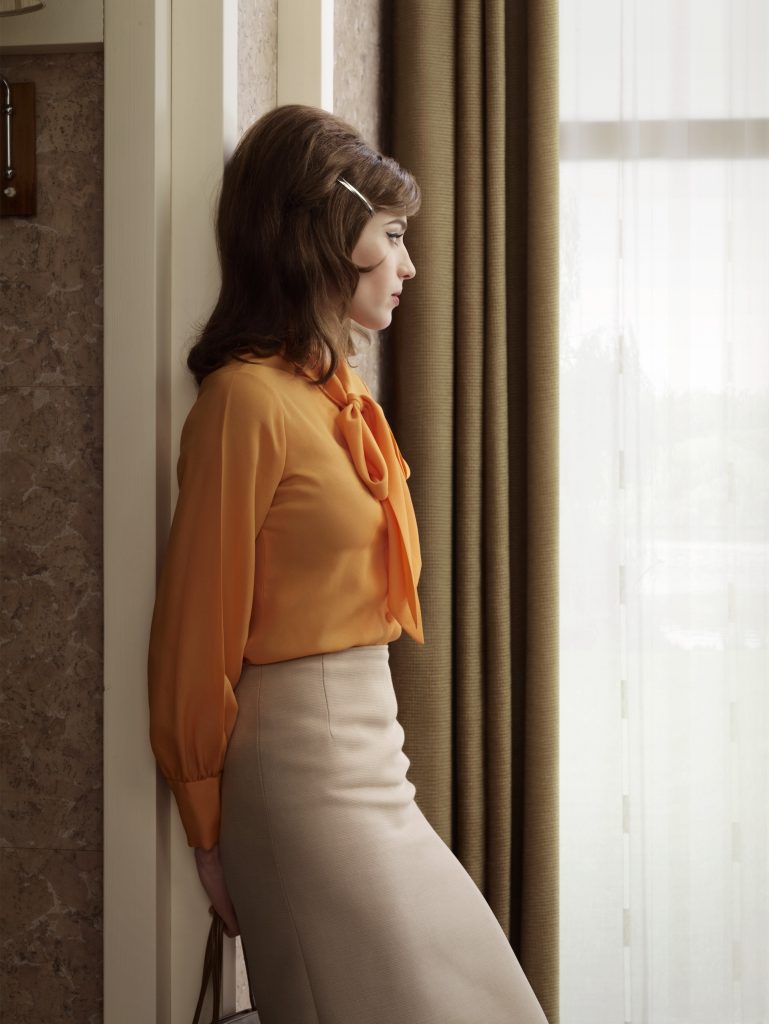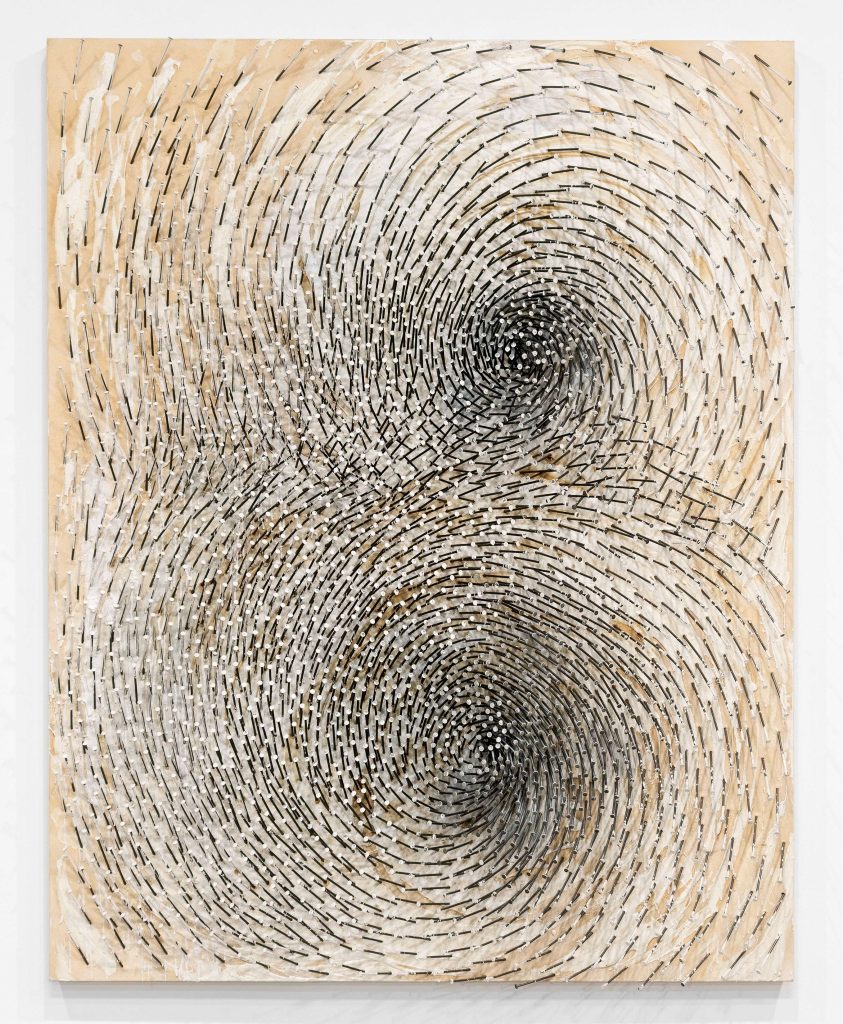‘This is who I am. I can’t do anything else.’
Interview with Erwin Olaf
Growing older fascinates him. ‘I have become more interesting.’ But he also feels sicker and laments the dullness that has come into his bright blue eyes. In his work, Erwin Olaf (1959) is ready for a new story: film, opera.

What do you see when you look into the mirror?
'A man who is a bit tired. Old age is starting to strike. I can see it in my face. But I don't mind it anymore. I don't need to be one of the boys anymore.'
What do you like about your own face and what don't you like?
'It fascinates me that I am getting older. I have become more interesting, externally, but even more so in my work. What I do regret is that a kind of dullness has come into my eyes. The sparkle of before is gone. I also see a sicker man. I can see it in my mouth. If, like me, you suffer from COPD [Chronic Obstructive Pulmonary Disease, a chronic obstructive lung disease], the way you breathe becomes different.’
What did you get from your mother?
'My eyes. And beyond that: the creative, observing, analysing. My mother can watch very well. So can I, and you can find that in my work. I always look. Once every few months, I get called out for being a faggot, usually by North African boys. That's because I watch. Not with a sexual purpose, although that is sometimes included, but I watch for appraisal and inspiration. Just like my mother. She watches and she appraises. She immediately senses if the atmosphere is good, and if I am sad.'
And from your father?
The intensity. Pushing through with your head down. My father was a small business owner, a minor hustler. But one who didn’t know how to give up. A hothead. I got that from him. Being able to get angry and then immediately deflate. I explode and implode in the span of a minute.
'I have my father's intensity. Pushing through with your head down.'
Were you a beloved child?
'At home I did, and especially with my mother. There were three of us boys. That means sometimes fighting for a place on the monkey rock, but it was still a harmonious family. I was only bullied at school. I was very girly, didn't play football, played with girls, acted feminine. I was bullied with my homosexual preference, even though I wasn't even concerned with it myself yet. That lasted until the second grade of secondary school. Then a group of Moluccans came to school. Mega hip guys. One of them said: ‘ You look great. You should go to the Salty Dog.’ That's where I went to buy my clothes. Suddenly I looked very worldly and they loved me.'
Who has had the greatest influence on who and what you are today?
'Personally, I feel I only started living from the age of 13. Thanks to David Bowie, whom I saw, with my mother on the sofa, on Toppop. It was one of the first music videos, 1973, and suddenly I saw a world that didn't exist in Amersfoort or Hoevelaken. I immediately thought: that's what I want. But ultimately it is my mother to whom I owe the most. She had absolutely no education, but in all her simplicity she encouraged reading, looking at things, art.'
Who did you learn the most from?
'From Teun, my first friend. He was the first one who saw something in me and started nurturing me intellectually. He was 28, I was 18. One of the first gifts I got from him was that he took me to Paris. To Centre Pompidou for the first time, Andy Warhol, Yves Klein. I didn't know all that, but I soaked it in.'
What was the first work that made a crushing impression on you?
'The ballets Live/Life, by Hans van Manen and Rudi van Dantzig. Holland Festival 1979. I was sitting at the very top of Carré. My first ballet performance - and I saw something of indescribable beauty for the first time. And in the same year: the great retrospective of Picasso at the Grand Palais.'
And what started the discovery of your own talent?
'I was at the School of Journalism and wanted to interview Marte Röling. In the Volkskrant she had said, ‘The fact that I have a cunt has nothing to do with my work.’ Great quote. I made an appointment. And a photographer had to come along. My photography teacher, Dirk van der Spek, saw that I had more talent for photography than writing, and said, ‘You photograph.’ I took my first portrait photos of Marte, smoking cigars. It became very enjoyable. During the interview, she got a bit groggy. And, diligent as I was, I wrote everything down.'
When did you know the camera would become your tool?
'When I met Hans van Manen. I was a volunteer at the COC and one day I had to portray Hans van Manen for the COC magazine. I came in and he was sitting in his chair looking at me over his shoulder. ‘OK,’ he said, ’you can photograph me if I can photograph you.’ That's how it started. He has always believed in my talent and has been very important to my development.'
What do you consider to be your greatest achievement?
'That I am still there as a photographer and artist. That I have never gone bankrupt. And that I succeeded without having to say much ‘thank you’. My father went bankrupt. I have always remained afraid of it, of the sadness I saw in my parents. I really like saying thank you to people close to me, like Shirley, my manager, but outside of that, fortunately, I don't have to. I have done it all myself. I’ve never had to eat humble pie.'
And what is your biggest defeat?
'Things are starting to change a bit now, but it is still difficult to accept that I still do not feel 100 per cent recognised as a Dutch photographer in my home city of Amsterdam. In my personal life, there are few things I consider a defeat. I quit smoking. I am not addicted. With my father, I talked everything out. When he was lying in hospital like a plant after his third brain haemorrhage and they started disconnecting the equipment, I stood over his bed and thought: thank goodness, everything has been said.'
Artistically speaking, what do you consider your big win?
'The series Grief. When I made those, there was a kind of dull silence in the studio and I wondered: is it good what I'm doing? Until then, there was always a kind of sensational feeling, because everyone was just screaming. But this was about sadness and depicting it - and that struck a very deep chord with me.'
And is there also an artistic flaw?
'Every time we meet, Hans van Manen says, ’You should photograph more celebrities. Then you will become more famous.’ He's right, but I don't like doing it. It makes me feel unhappy. I don't consider myself good at portraits. And celebrities make me extra insecure. When I photograph Máxima, I'm really searching and changing techniques too much. Of course, I have made quite a few beautiful portraits, but with me they are always dark and gloomy. That's just my story.'

What drives you and your work?
'It's a drift, a kind of energy. I do it to get through the time we are here in an insanely good way. This is who I am. I can't do anything else. Yes, printing photos, I can do that. And waitressing, I used to be really good at that. Chit-chatting, you know.' (laughs)
Where are you now in your artistic development?
'I am at the end of what I will call my mid-career cycle. I've done a lot of cycles. It started with Separation, about relationships between people, mother and child. And later Hope and Grief. With these, I have gradually come to the end of my story. A new, clear story is not there yet. I have rearranged the darkroom, am printing again. I love doing that, it produces wonderful material, but otherwise it's a time of experimentation.'
You're also expanding your arsenal: film, opera.
"I find it interesting to explore boundaries. What is still photography, and where does something else begin? This week, I was at the Film Fund. I’m going to direct Een schitterend gebrek, based on the novel by Arthur Japin. That story grabbed me from the very beginning. It will be my first feature film. And I’ve been asked by a German opera house to design an opera. Amazing, that someone comes to you and says: ‘We think you can do this.’ It’s incredible, thinking that when I’m in my grave, this is what I’ll leave behind."
Has death taken a bigger role in your life?
'No. I used to be afraid of death. They say that in your last seconds the film of your whole life is played, right? I was afraid I would only see black holes then, because nothing of any importance had happened in my life. I no longer have that fear. The black holes have disappeared.'
No more shortage in your life?
'No, at most a lack of oxygen. But my illness has also enriched me in a way. I am forced to think, every day, with every step I take. The awareness of time has brought me depth. But I haven't made a bucket list, nothing. As Teun, my ex, said when he got that terrible news about his health, ‘You know, Erwin, I don't need to go to Peru anymore. I've been to Peru a long time.’ Teun has never been to Peru. Neither have I, and I don't need to go anymore, you understand?'
How is your own illness now?
"I can feel the gradual shift — it’s been happening for a while. I was fit up until fifty, but these days, you’d leave me behind on a walk. On the other hand, we’ve never had it better. Just look: we’ve got a stairlift, an electric bike. I’ve got one — I cycle! My mother is in a care home. I'd rather not talk about that. But when the time comes, I’ll be able to create a room, maybe a whole floor, where a nurse can live. I have a bookshelf. I can see the little birds outside. I can stay in my own habitat. I’ll be sitting there, and when it’s needed, I’ll just pay a man or a woman to take shifts wiping my behind and bringing me food. That’s what life has given me."
Who would you say is the Johann Sebastian Bach of your field?
First of all: a good photographer is a dead photographer. (laughs) If I had to choose one, I’d say Richard Avedon. No — one more: Henri Cartier-Bresson. One for staged art, the other for documentary.
Can photography move us?
‘I have a hard time with that, with that question. In this I feel jealousy toward music, literature, cinema. Apart from the mother of photography, war photography, it is very difficult to move with a photograph. Photography is very concrete. Take L'origine du monde, that painting by Courbet, of that pussy. If you photograph it, it's porn, if you paint it, it's a masterpiece. Photography is a hard medium.'
What was the first time you touched some emotion with your work?
'That only happened with the series Rain. The little boy at that ice-cream parlor, with that ice cream in his hand. That was the first time I, unconsciously, got hold of an emotion.'
What moves you?
Film, literature — not that I’m a big reader, but still. And music, classical music. But politics can also move me. I’m deeply saddened by what’s happening in America. The fact that such a man is elected. I’ve had a good cry about that. The image of Obama, with that little boy in his Superman suit. And Merkel. Such an ordinary woman from East Germany, a small, chubby little thing, but there’s such incredible civility in her. That really moves me.'
Is there a secret ...
'Sure, and I'm not going to tell you that either.'
... pleasure in your life?
'Oh, you mean that! Well, I find sex delightful, but the sex life must remain secret. I don't need to know anything about you until I have sex with you. Sex is a wonderful drive in life - for decadence, for dancing on the edge of the volcano, but I think sex should be kept a little dingy and secret. Otherwise there's no shit left to it.'
What self-portrait would you use to illustrate this written self-portrait?
'After Charlie Hebdo, I took two pictures, in traditional Islamic clothes, and with one of those rubber balls in my mouth. Those express very well my feelings of anger and despair. Anger & Tamed. You may choose one of them. That's how I still feel. Muzzled. Since 9/11, we have slowly but surely become muzzled. This portrait is my silent protest.'




















